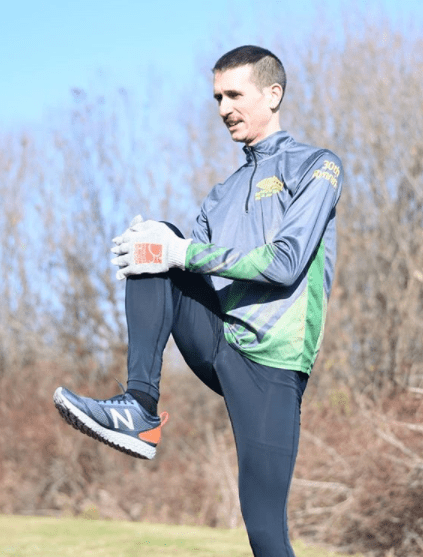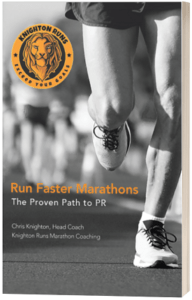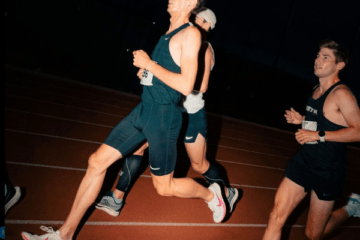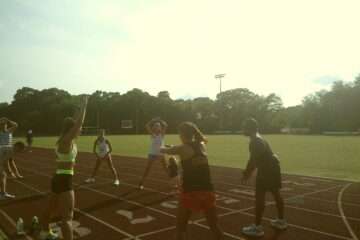Warm up to Build Self-Confidence
Written By: Coach Chris

Importance of the Warm-up
Add a dynamic warm-up before every workout and race and you will feel like a Pro! It’s obvious before the start of a workout or race who is preparing to truly run hard from the gun and who is not. Design a warm-up of jogging, stretching, drills, and strides and be consistent with it. Go through your routine before every hard run. Not only will your body be more ready to run, your mind will get in the zone too.
By warming up before every hard run, you give yourself the opportunity to clear out bad physical and mental feelings you may be harboring. You take a moment for inward focus and commitment to the task ahead, and build self-confidence in knowing you are doing the little things right that will lead to success.
Your warm-up should be a ritual. You should perform it without thinking before all hard runs. It should be grounding, calming of pre-race and pre-workout nerves. Don’t think about it, just do it.
The goal of the warm-up is to clear out junk and prime your systems for success. It is completely normal to feel bad during your warm-up. This does not mean your workout or race will go poorly. Do not be tricked into thinking that just because you feel bad during your warm-up that you are in for a bad performance.
Many of my best workouts and races have come after crummy-feeling workouts. Yours will too.
Typical Warm-up Routine
Start warming up 30 minutes to 60 minutes before a race. The shorter the race, the longer the warm-up. This is because you need to be more ready to run fast from the start. For a shorter race, you need not worry so much about tiring yourself out in the warm-up.
For a mile, I would start jogging up to an hour before the start. Whereas for a Marathon, I may only start 20 minutes beforehand or may do no real warm-up at all.
The exact moves you perform in your warm-up are not as important as simply performing a ritualistic series of moves that make you feel ready to give your best.
Don’t get so caught up in worrying about what moves are ideal that you give up and fail to consistently perform a sincere warm-up. Any warm-up done consistently is better than no warm-up or an inconsistently done one.
Below is my typical warm-up:
- Start with a jog of 15-20 minutes at a very easy pace.
- Jogging raises your heart rate and core temperature, thereby increasing the fluidity of your body movements so you can run faster and with better form in the coming hard run.
- Easing into hard running may help prevent injuries caused by unexpected, sudden movements.
- Try to relax mentally and physically during your warm-up. I try to just let my mind go quiet and focus on how I’m feeling and the nice things around me.
- Perform 10 minutes of dynamic stretches and drills.
- Dynamic Stretches and drills bring our muscles through their full range of motion and prepare them to run fast.
- Pick 5-10 movements that you like the best that cover all areas of the body.
- Start with simple movements and finish with more complex movements.
- My go-to dynamic movements: Arm Circles from The Shoulders, High knees, Heel pulled to butt, Ground sweeps, Lunges, Hip openers, Glute bridges, A-Skips, B-Skips, Karaoke.
- I don’t do static stretches before hard runs. I save these for after my running is done for the day. Other’s benefit from pre-run static stretching… find what works for you.
- I recommend doing dynamic warm-up movements with bare-feet. This will help strengthen your feet, ankles, and lower legs. It will also improve your running form. A 400-800m run or walk barefoot can also be a great addition to the warm-up. Ease into the barefoot stuff if you are new to it.
- Strides
- Run 2 to 4 x 100m strides at your race or workout pace. Give yourself 1-2 minutes of full rest between each stride to allow full recovery between them.
- The goal of these strides is to give you a taste of the pace to come.
- Practice the pace in the warm-up and you won’t be surprised by what race pace feels like. You won’t start too fast or too slow.
- Final Actions and Go Time!
- End your last stride 5-10 minutes before the start of a race so you are fully recovered. If you are warming up for a workout, you can just jump right in to it after a few minutes.
- About 10 minutes before the start of a race, I go to the bathroom one last time, then to the corral and seed myself.
- A few minutes before the start, I’ll take off any extra layers I am wearing and leave them at the start (with a friend or in a bag).
- In the corral, I try to keep warm with some more dynamic movements. At this point you should feel ready to run race pace, so just stay warm however works for you.
- If it’s cold, avoid ending your warm-up premature and letting yourself cool down before the start.
- If it’s hot, make sure you don’t get so hot during your warm-up your performance will be compromised.
- Then it’s go time! Remember the first mile will always feel very easy… it is supposed to. Stay calm and relaxed and do NOT push the pace faster in the beginning. Save what you got for the end.
Practice makes Perfect
When you first start practicing your warm-up, you’ll feel goofy and maybe a little embarrassed. Don’t worry, this feeling will go away and be replaced with confidence as you realize your ritual is leading you to success. Also look around and you’ll see all the “fast people” warming up hardcore!
Whatever you do for a warm-up routine, it’s important to practice it
before race day and be comfortable with it. You’ll see a lot of people on race day doing silly movements they never practice. Trying some new stretch or drill on race day is just a bad idea. You don’t want to tweak anything right before showtime!
Make a ritualistic warm-up, practice it before every hard run, and it will become second nature after a few workouts. Embrace the warm-up and know you are warming up the way the very best athletes do!
Watch This Video: How to Perform a Dynamic Warmup!
The Knighton Lions Dynamic Warmup Routine (Shown in Video Above)
This full routine can be done in 15 to 30 minutes once fully mastered (i.e., 5 to 20 minutes for jog + 10 minutes for warmup exercises).
You can extend the warm up by repeating exercises or taking longer breaks between each exercise to extend it to up to 60 minutes when needed before a race.
Warm up jog:
Easy jog 5 to 20 Minutes (*exact length depends on mileage goals for day and experience level of runner)
Standing Exercises:
5 sec – Arm Swings Forwards
5 sec – Arm Swings Backwards
5 sec – Standing Hip Rotations Clockwise
5 sec – Standing Hip Rotations Counter-Clockwise
6x Pull Knee to Chest (3x each leg)
6x Pull Heel to Butt (3x each leg)
6x Reach up Tall then Touch Alternating Toes (3x each side)
6x Forward Lunge (3x each side)
6x Ground Sweep (3x each side)leg)
10x Side Lunge (5x each side)
20x Leg Swings Front to Back (10x each leg)
20x Leg Swings Side to Side (10x each leg)
Form Drills:
1x A-March (20 meters)
1x A-Skip (20 meters)
1x B-Skip (20 meters)
1x C-Skip (20 meters)
1x High Knees (20 meters)
1x Butt Kicks (20 meters)
1x Straight Leg Bounding “Prime Times” for Frequency (20 meters)
1x Straight Leg Bounding “Prime Times” for Distance (20 meters)
1x Bent Leg Prime Times “Prime Times” for Distance (20 meters)
2x Sideways Jumping Jack (20 meters – both directions)
2x Kareoke ( 20 meters – both directions)
Optional Plyometrics for Speed Workout Days:
Box Jumps Plyometric (5 consecutive jumps)
Bounding for Height and Distance (5x off each leg)
Pogo Jumps for Height (5 consecutive jumps)
Final Exercise to End Warm-up Routine:
2 to 4 x 100 m strides at mile-effort with 60 second standing recovery
That’s it! Next up begin speed workout or race!
Note: This is an advanced skill that takes a lot of repetition to learn and will be a practice you continually work on throughout your running career. Please message me if unsure about how to do any of this!



